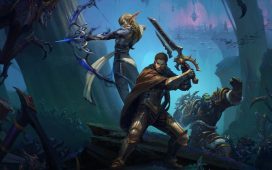When Blizzard suspended professional Hearthstone player, Blitzchung, for expressing his support for Hong Kong on a very public platform – the Hearthstone Grandmasters stream – one thing it probably didn’t account for was the outpouring of support and the furore that followed. Long-time players threatened to boycott Blizzard games. Employees staged walkouts with umbrellas, a key symbol of resistance in the Hong Kong protest. United States senators, Ron Wyden and Marco Rubio, as well as representatives Alexandria Ocasio-Cortez, Mike Gallagher and Tom Malinowski, signed a letter to Blizzard, requesting the ban be fully reversed. And in Hong Kong, an anonymous group of game developers witnessed the far-reaching impact of his actions and was inspired to make a game about being at the frontline of the protests against the barrage of attacks by the riot police. The result was the protest game, Liberate Hong Kong.
“The initial idea [behind] this game is the incident of Blizzard. Blitzchung Ng just said eight words, [and] it created a large influence over the world,” one member of the team, who asked to remain anonymous for fear of reprisal from the authorities, told Eurogamer. “We want to replicate this effect to promote the protest in Hong Kong.”
And it worked. Liberate Hong Kong was covered extensively in international media, from the BBC to Bloomberg, which helped draw widespread condemnation for the Hong Kong police’s brutality against protesters.
In light of the protests sparked by the unpopular extradition bill in the country, more games like Liberate Hong Kong have emerged. These are often rudimentary and unpolished, due to many being developed and published within a short time-frame – Liberate Hong Kong, for instance, was made in just two weeks – but they are still powerfully evocative. Liberate Hong Kong takes place at the heart of the protest at Argyle Street, replicating the tense standoff between the protesters and police. You play as an anonymous protester, decked in black clothes, yellow construction helmet, gas mask and a make-shift shield in the form of a stop sign. As you navigate through the barriers to collect canisters of tear gas, police officers shoot rubber pallets and rampage towards you when you get too close. This is exacerbated by the blinding strobe lights shone by the police, which makes it harder to navigate the streets, and is one real-life tactic used to disrupt the protest.
“When you go into the game, it’s on Argyle Street. I didn’t realise that when I downloaded the game. I knew that it was set in the Mongkok district, but when I went into the game and I literally saw the road sign, it was Argyle Street, my first thought was, ‘Oh wow,’ ” says Rhys Jones, a second year Ph.D student and video game researcher at The Hong Kong Polytechnic University.
“Argyle Street is actually the big street where they actually have a lot of big clashes between the police and the protesters, so [the location] is definitely accurate in that sense.”
The developers I spoke to for this article said they knew their games weren’t made to change minds. While some Hong Kongers who didn’t participate in the protest are impressed by the immersive experience of Liberate Hong Kong, particularly in virtual reality, the team was well-aware the game might have drawn sharp criticism. “This game is not targeted at pro-China players, as I know they are [already] dissatisfied with the game,” they said.
Karma, a dystopian visual novel by Hong Kong studio Herstory, is another game that attracted seething vitriol from Chinese players. Set in a fictional city, Karma tells a story about its citizens who were suppressed by the nation’s totalitarian rule. Herstory isn’t shy about the game’s influences, with its Steam page stating it was inspired by the “sadness and sorrow in Hong Kong”.
“For China, we have some supporters as well, but most of them just contact us via private message since they are afraid of [the] China government,” added Arte Lee, producer at Herstory. “Other than that, most of the China netizens [who] commented [publicly] hate us so much, and we received tons of hate speech via Twitter, Facebook and Steam.”
As shared by the team, many public posts on the game’s Steam page range from threatening (“Your support for an independent Hong Kong is breaking criminal laws”) to reiterating Hong Kong’s supposed inseparability from China (“Hong Kong will always be inseparable from China and her citizens”). One commenter on Twitter even pleaded with the developer to stop inserting politics into Steam for fear of losing access to the platform, citing sensitivities around China’s strained relationship with the NBA.
Jones agreed these games haven’t really influenced public opinions in Hong Kong, since news about the protests are already commonplace. “The games don’t really have a chance to make a difference with all that noise, but they are making much more impact internationally, [with] some places talking about them.
“Obviously it’s good someone is making them and it allows other people to experience those things. [There are still] a lot of people in Hong Kong [who] don’t know what it’s like to experience a tear gas attack, for example. So even though it mostly benefits the international audience, it still has value to other Hong Kongers as well.”
Spinner of Yarns, the creator behind text-based protest game The Revolution of Our Times, says Hong Kong players have responded positively to their game. Told from the perspective of a protester, it’s a choose-your-own-path game that allows players to decide what they would do during the protest themselves, such as whether to defend a fellow protester who was confronted by the police, or avoid the chaos by staying home during the protest’s most pivotal moments.
“I opened a post on LIHKG (a Hong Kong forum) after Google accepted the initial production release of The Revolution of Our Times, and it soon attracted hundreds of people, mostly Hong Kongers, to download within the first few hours,” Spinners of Yarn says.
“From what I have heard, they love they can get to live through what happened back in early June 2019 again, while some say there is plenty of room for improvement of the UI/UX.”
At the very least, creating these games has proven to be cathartic for the developers. For Herstory, development on Karma started when the protest started to escalate in June 2019. “After the chaos made by the Hong Kong government – shooting a third stage lung cancer elderly using rubber bullets, unlawfully launching tear gas on the place where letter of no objection had affected – our Hong Kong members are extremely depressed and lost the focus on Hime, our original Otome SLG (simulation game) project,” says Lee.
“To pull ourselves up again, we think creating a short story which [is] familiar to [the] current status of Hong Kong may help.” They originally planned to donate all proceeds from the game to Spark Alliance, a non-profit organisation dedicated to financing bail payments for arrested protesters. However, the organisation had since been unable to receive donations, with four members arrested for alleged money laundering.
“Due to the situation, the organisation’s donation account is temporarily closed, and the gift card originally used for donation on the website Our Hong Kong Work is also temporarily taken off the shelves,” says Lee.
Such repercussions are also why the Liberate Hong Kong team has largely chosen to stay anonymous. “We are still afraid the Hong Kong government will arrest us as they will do anything to stop the movement. Besides, we do not want to earn any credit from this game, this game is made by a group of Hong Kong protestors,” they said.
Meanwhile, Spinner of Yarns developed The Revolution of Our Times in response to what was happening around them. “It took me about one month to develop this game, from scratch to finish. I resigned from my last job in late August 2019, and then started working full-time on this project immediately.”
Yet the path to getting their games published on major gaming platforms was paved with much difficulty. Liberate Hong Kong was denied publication on Steam since October last year, with the team getting no word about their submission despite following up several times. “I submitted the game on 18th October 2019. They never reply to me. I think they will ignore our request forever,” says one member of the team.
Likewise, Herstory also submitted Karma to Steam for review in October. Lee says “[the] Steam team responded normally and real quick” back then. But after removing some bugs and resubmitting the title in November, Steam has since been slow to reply, Lee says. According to Lee, that was also when Chinese netizens started to bombard their Steam and Facebook pages with negative comments.
“We are still waiting for the Steam team’s latest reply at the moment,” Lee says. “but we think there is very little chance Karma will be available on Steam, as they keep on shutting down our help request without reply recently.”
These complications have added another layer of ambiguity to Steam’s review process, even though Valve has previously said it will only remove content that is “illegal or straight-up trolling”. What’s more is political games have long been launched on Steam. One of the platform’s top-selling political games is the recent FMV title, Not For Broadcast. Valve did not respond to any requests for comment about the status of these games.
Fortunately, both games were right at home on itch.io. “The launch of Karma on Itch is smooth and without any problem. We feel grateful about it!” says Lee. At the same time, Google has allowed The Revolution of Our Times to be launched again on Google Play, after briefly pulling the game from the app store for violating its policies around sensitive events.
In a fascinating twist of life imitating art, the manner of spreading the word about the Hong Kong protest is rife with gaming terminology. “There were some examples of people saying they need to block certain areas to block the police spawn points,” says Jones. “A lot of the pervasiveness of the game language is working its way into the protest language.”
Similarly, players from China and Hong Kong have clashed virtually on Grand Theft Auto, with one side taking up arms as the protestors and the other as the Hong Kong police. These developments are a sign of the burgeoning influence of video games on protests and current affairs – with games serving as both a digital arena and a vehicle for their pro-democracy messages.













